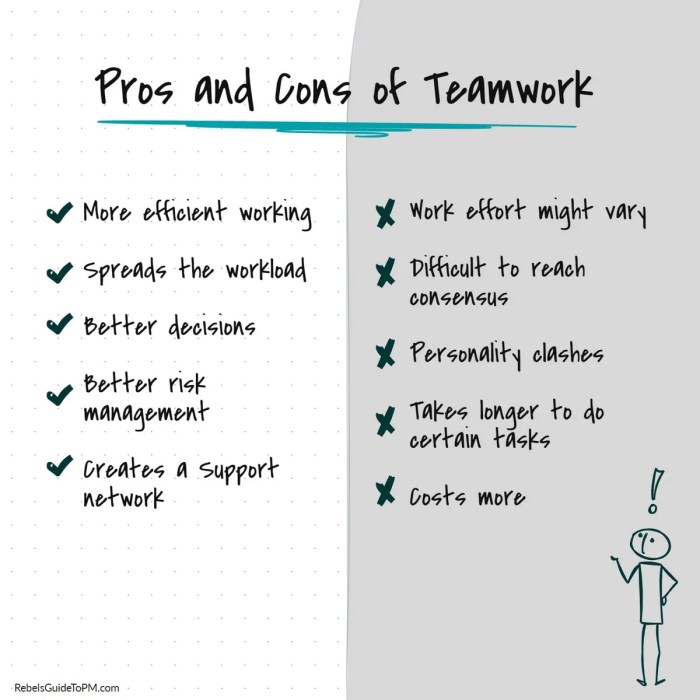Team Management Skills are like the MVPs of the workplace, leading the pack with finesse and strategy. From boosting productivity to handling conflicts like a boss, these skills are the real game-changers.
When it comes to mastering the art of team management, there’s a whole playbook of key elements and challenges to tackle. Let’s dive in and uncover what it takes to lead your team to victory.
Importance of Team Management Skills

Team management skills are crucial in a work environment as they help in fostering collaboration, communication, and coordination among team members. Effective team management can lead to increased productivity as it ensures that tasks are delegated efficiently, goals are clearly defined, and resources are allocated appropriately.
Improved Decision Making
Effective team management enhances decision-making processes by leveraging diverse perspectives and expertise within the team. This collaborative approach results in well-informed decisions that consider various angles and potential outcomes. It also promotes a sense of ownership among team members, leading to better implementation and follow-through of decisions.
- Encouraging open communication and brainstorming sessions to gather different opinions and ideas.
- Empowering team members to take ownership of their responsibilities and contribute to decision-making processes.
- Utilizing tools and techniques such as SWOT analysis or consensus building to reach informed decisions.
Boosted Employee Morale
Poor team management can have a detrimental impact on team morale and success. When team members feel disorganized, undervalued, or unsupported, it can lead to decreased motivation, engagement, and ultimately affect overall team performance.
- Recognizing and appreciating the efforts and contributions of team members to boost morale and motivation.
- Addressing conflicts and issues promptly to maintain a positive team environment and prevent negativity from affecting team dynamics.
- Providing opportunities for professional growth and development to keep team members engaged and committed to their roles.
Key Elements of Team Management Skills
Effective team management skills encompass various essential elements that are crucial for leading a team to success. One of the key components of team management is communication, which plays a vital role in fostering collaboration and ensuring clarity among team members.
Communication
Communication is the cornerstone of successful team management. Clear and open communication helps in setting expectations, sharing information, and resolving conflicts effectively. It involves active listening, articulating ideas clearly, and providing constructive feedback to team members. Without effective communication, misunderstandings can arise, leading to decreased productivity and cohesion within the team.
Conflict Resolution
Conflict resolution is another critical element of team management skills. Conflicts are inevitable when working in a team, but how they are addressed can make a significant difference in team dynamics. Effective conflict resolution involves identifying the root cause of the conflict, facilitating open discussions, and finding mutually beneficial solutions. It requires empathy, patience, and the ability to mediate disagreements in a fair and unbiased manner.
Delegation
Delegation is an essential element of team management skills that involves assigning tasks and responsibilities to team members based on their strengths and expertise. Delegating effectively helps in distributing workload evenly, empowering team members, and fostering a sense of ownership and accountability. It also allows the team leader to focus on strategic tasks while ensuring that all project requirements are met efficiently.
Decision Making
Effective decision making is crucial for successful team management. It involves analyzing information, considering various perspectives, and making timely and informed decisions that align with the team’s goals and objectives. Decisive leaders inspire confidence among team members and ensure that progress is made towards achieving project milestones.
Adaptability, Team Management Skills
Adaptability is a key trait of effective team managers. In today’s rapidly changing work environment, the ability to adapt to new situations, challenges, and unforeseen circumstances is essential for steering the team towards success. Adaptive leaders can pivot quickly, adjust strategies as needed, and guide their team through uncertainty with resilience and confidence.
Developing Team Management Skills
To become a master at team management, it’s crucial to continuously work on improving your skills. Here are some strategies to help you develop your team management skills:
Seek Feedback Regularly
Feedback is like a gift, so don’t forget to unwrap it!
- Schedule regular check-ins with your team members to discuss what’s working well and what can be improved.
- Ask for feedback from your superiors, peers, and even clients to get a well-rounded view of your management style.
- Be open to constructive criticism and use it as a tool for growth.
Participate in Training Programs
Invest in yourself to invest in your team!
- Attend workshops or seminars that focus on leadership and team management skills.
- Enroll in online courses or certifications to deepen your understanding of effective team management techniques.
- Join professional organizations or networking groups to learn from industry experts and share best practices.
Lead by Example
Actions speak louder than words!
- Model the behavior you want to see in your team members, such as effective communication, problem-solving, and collaboration.
- Show empathy and understanding to build trust and rapport with your team.
- Stay organized and prioritize tasks to demonstrate good time management skills.
Challenges in Team Management

Managing a team comes with various challenges that team managers need to address in order to ensure productivity and harmony within the team. These challenges can range from communication issues to conflicts among team members.
Identifying Common Challenges Faced by Team Managers
- Communication breakdowns leading to misunderstandings
- Conflicts among team members
- Resistance to change or new ideas
- Unequal distribution of workload
Strategies for Overcoming Challenges in Team Management
- Encouraging open and transparent communication
- Implementing conflict resolution techniques
- Providing training and support for team members
- Regularly reviewing and adjusting team goals and objectives
Handling Conflicts Within a Team from a Management Perspective
- Address conflicts promptly and impartially
- Encourage open dialogue and active listening
- Seek to understand the root cause of conflicts
- Implement mediation or team-building activities to foster better relationships




